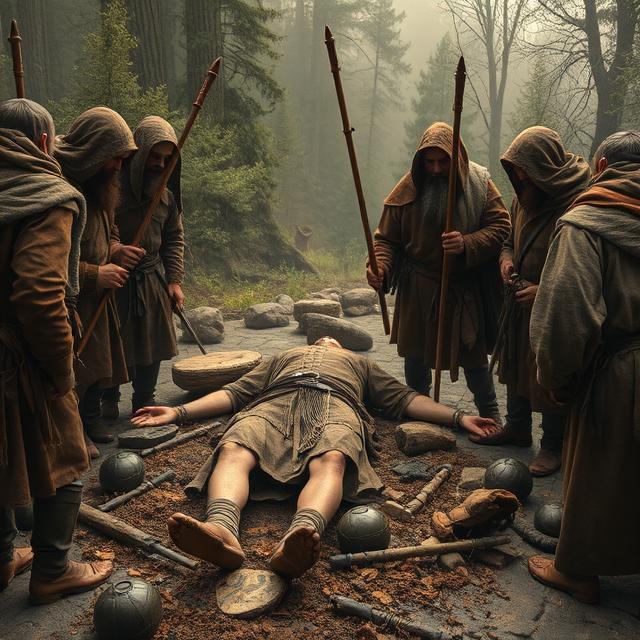The night is thick with cold. You refuse the oar and the net. The threat once veiled is now certain: you are to be offered to Odyn. The storm-god expects sacrifice, and you are to meet him.
Still, the days until the offering stretch long. You are kept near the water’s edge, fed, clothed, bathed. Your hands, once accustomed to sword and saddle, now lie idle, but your body is cared for as if you were royalty. For a time, the constant attention dulls the ache of grief, and you almost forget the weight of your past. You walk the cliffs at dawn, watch the horizon, let the waves whisper to you. For brief hours, life feels suspended, fragile yet almost gentle.
Three weeks pass in this uneasy routine. You train in the motions of labor you cannot master, watch the sea and sky, laugh quietly at gulls diving for scraps, at children running barefoot along the docks. Comfort brushes against your skin, but it is a fragile, fleeting illusion. Death looms regardless.
The night before the sacrifice, you sit on the cliffs, staring at the dark swell of the sea. Acceptance settles into your bones. You are ready. You will meet whatever fate the gods demand, and perhaps, finally, sorrow will release you. When the elders bring the carved bones to cast your fate, you bow your head, letting the shadow of Odyn fall upon you. You do not struggle. You do not protest. Survival is not yours to demand.
The village is quiet, the only sounds the crackle of fire and murmured prayers. Margaret’s mother and sister watch with cautious eyes. They have offered you shelter, given you food and refuge, and now they test the limits of that mercy. You remain still. The bones tumble across the slab, rattling against stone as if fate itself stirs in the air.
Your heart thumps as the elders bend to read them. When the bones settle, your name is not called. You are spared. Relief washes over you, heavy and trembling. The women beside you exhale softly. You are alive. You have survived, though life will not return to ease. You’ve just gambled and Odyn took someone else’s life in your stead.

You are no longer confined to the hut, no longer bathed and tended as a king-in-exile. Freedom is yours, but it is heavy, unfamiliar. Every day reminds you of the fate you narrowly avoided. The sea roars, the cliffs loom, and you walk among the villagers like a ghost among the living. You survive, but the life that was taken from you remains beyond reach.
You watch the women work, tending goats, cooking, maintaining the hut. They do not scold, do not demand. They offer quiet expectation, insisting you exist within the rhythm of life. Their resilience impresses and humbles you. You are part of this village now, even if your heart is elsewhere, tethered to memories of Aldebryn, Moravice, Claudius, Margaret.
Days stretch forward in monotony. You walk the cliffs at dawn, stare at the horizon, listening to the gulls. You let the wind remind you of the past, let the waves whisper what they will. You live, and that is enough. The villagers survive too, and you witness their labor, their small triumphs, their endurance. Life continues, indifferent to grief, indifferent to destiny.
Weeks turn to months. You remain among them, neither fully part of their world nor removed. Exile defines you. Survival, once a gift, is now a daily challenge: to endure the monotony, to maintain a body and spirit that has known war, betrayal, loss. You are spared by chance, by fate, by the gods themselves, yet the price is solitude and displacement.
You think of Claudius, Aldebryn, Moravice, Margaret. Memories press like cold stones against your chest, but you endure. The villagers’ quiet strength becomes your guide. You do not fish. You do not labor. You exist, and that is both a blessing and a burden.
The cliffs and the sea become your companions. The wind carries stories, the waves remind you that the world turns relentlessly. You survive, but the life you imagined, the destiny you pursued, will never return. You are alive, far from home, far from the future that once seemed yours.
You exist at the edge of the world, witness to life, survival, and the indifference of the elements. You are spared, but alone. You endure, a shadow in the village, a man at the mercy of fate. Every day, the cliffs, the waves, the villagers’ labor, remind you that you live on, despite the absence of all else.
You have survived Odyn’s demand, escaped the sacrifice, and yet the world does not restore what you have lost. Life presses forward, relentless. You are an exile, alive, unmoored, a solitary witness at the edge of existence. And in this survival, in this exile, you find a strange, cruel kind of peace.
You stare at the sea and think of all that has been taken — and all you have taken in return. Revenge, you realize, is not fire but frost. It burns nothing; it preserves the wound, keeps it untouched, unhealed, a monument to pain. You sought justice and found silence. You sought meaning and found the sea.
There is no balance, no final reckoning — only endurance. What is lost stays lost, and what remains is neither victory nor defeat, but the slow, stubborn act of breathing.
You have learned that grief is the truest form of memory, and that even in exile, the heart remembers its purpose: to beat, again and again, until the echoes fade.
And so you stand at the world’s edge, the waves breaking beneath you, knowing at last that some wars are not meant to be won — only survived.
…..
THE END
…..

One Comment